Entrepreneurial Ventures: Types, Impact, and Business Strategies
VerifiedAdded on 2022/12/27
|16
|5489
|84
Report
AI Summary
This report provides a comprehensive analysis of entrepreneurial ventures, exploring different types such as small, medium, and large businesses, as well as social, scalable, and serial entrepreneurship. It examines the similarities and differences between these ventures and analyzes their impact on the UK economy, particularly focusing on micro and small businesses. The report interprets data and statistics to demonstrate the significance of these businesses in terms of revenue generation, employment, and market development. Furthermore, it compares small, medium, and large businesses and evaluates their impact on local, regional, national, and international contexts. The report also delves into the characteristics, skills, and motivational drivers of successful entrepreneurs, highlighting the importance of strategies to improve competitive edge and market position. Finally, it analyzes the impact of entrepreneurs' backgrounds and experiences on their ventures, providing a holistic view of the entrepreneurial landscape.
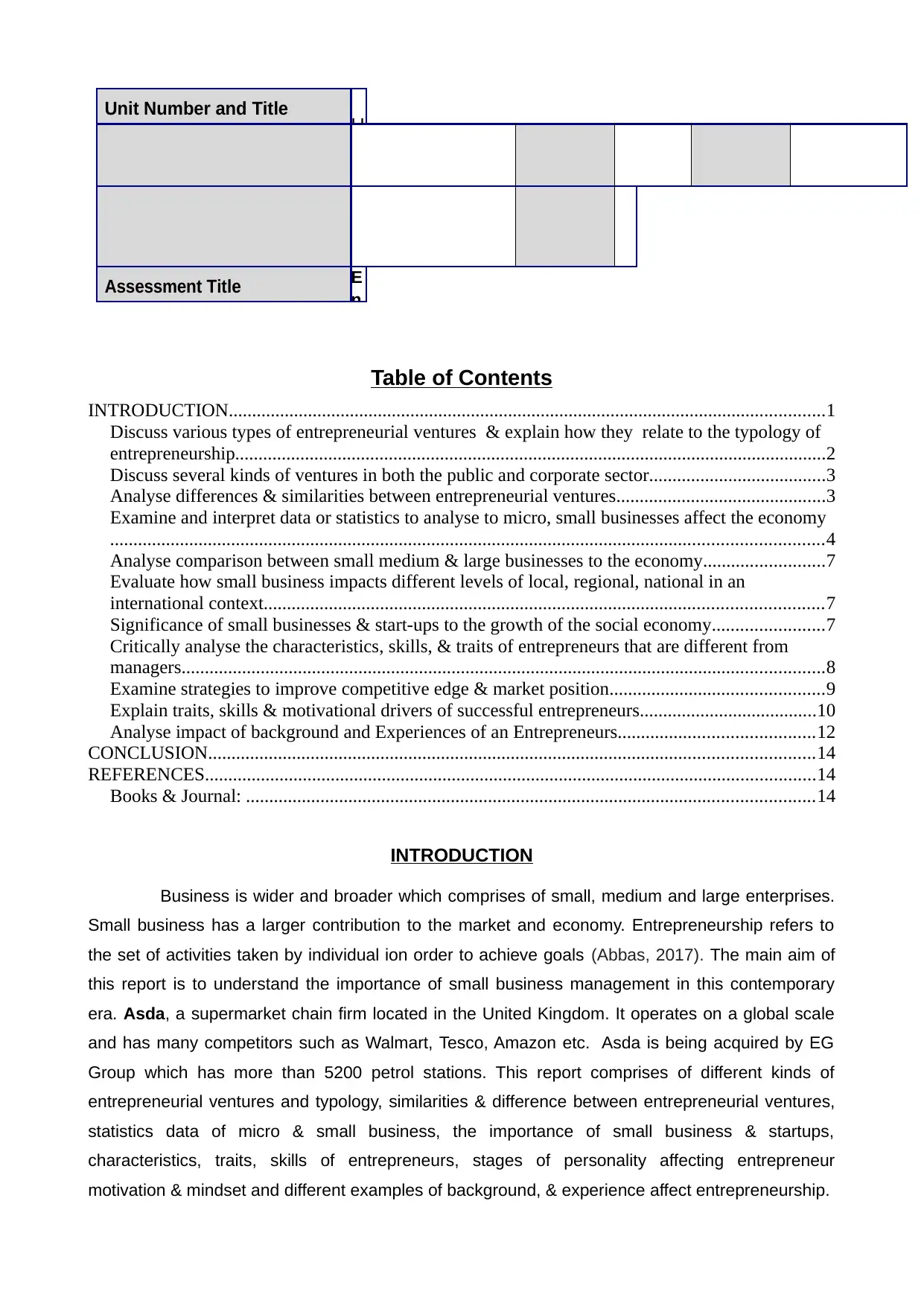
Unit Number and Title U
Assessment Title E
n
Table of Contents
INTRODUCTION................................................................................................................................1
Discuss various types of entrepreneurial ventures & explain how they relate to the typology of
entrepreneurship...............................................................................................................................2
Discuss several kinds of ventures in both the public and corporate sector......................................3
Analyse differences & similarities between entrepreneurial ventures.............................................3
Examine and interpret data or statistics to analyse to micro, small businesses affect the economy
.........................................................................................................................................................4
Analyse comparison between small medium & large businesses to the economy..........................7
Evaluate how small business impacts different levels of local, regional, national in an
international context........................................................................................................................7
Significance of small businesses & start-ups to the growth of the social economy........................7
Critically analyse the characteristics, skills, & traits of entrepreneurs that are different from
managers..........................................................................................................................................8
Examine strategies to improve competitive edge & market position..............................................9
Explain traits, skills & motivational drivers of successful entrepreneurs......................................10
Analyse impact of background and Experiences of an Entrepreneurs..........................................12
CONCLUSION..................................................................................................................................14
REFERENCES...................................................................................................................................14
Books & Journal: ..........................................................................................................................14
INTRODUCTION
Business is wider and broader which comprises of small, medium and large enterprises.
Small business has a larger contribution to the market and economy. Entrepreneurship refers to
the set of activities taken by individual ion order to achieve goals (Abbas, 2017). The main aim of
this report is to understand the importance of small business management in this contemporary
era. Asda, a supermarket chain firm located in the United Kingdom. It operates on a global scale
and has many competitors such as Walmart, Tesco, Amazon etc. Asda is being acquired by EG
Group which has more than 5200 petrol stations. This report comprises of different kinds of
entrepreneurial ventures and typology, similarities & difference between entrepreneurial ventures,
statistics data of micro & small business, the importance of small business & startups,
characteristics, traits, skills of entrepreneurs, stages of personality affecting entrepreneur
motivation & mindset and different examples of background, & experience affect entrepreneurship.
Assessment Title E
n
Table of Contents
INTRODUCTION................................................................................................................................1
Discuss various types of entrepreneurial ventures & explain how they relate to the typology of
entrepreneurship...............................................................................................................................2
Discuss several kinds of ventures in both the public and corporate sector......................................3
Analyse differences & similarities between entrepreneurial ventures.............................................3
Examine and interpret data or statistics to analyse to micro, small businesses affect the economy
.........................................................................................................................................................4
Analyse comparison between small medium & large businesses to the economy..........................7
Evaluate how small business impacts different levels of local, regional, national in an
international context........................................................................................................................7
Significance of small businesses & start-ups to the growth of the social economy........................7
Critically analyse the characteristics, skills, & traits of entrepreneurs that are different from
managers..........................................................................................................................................8
Examine strategies to improve competitive edge & market position..............................................9
Explain traits, skills & motivational drivers of successful entrepreneurs......................................10
Analyse impact of background and Experiences of an Entrepreneurs..........................................12
CONCLUSION..................................................................................................................................14
REFERENCES...................................................................................................................................14
Books & Journal: ..........................................................................................................................14
INTRODUCTION
Business is wider and broader which comprises of small, medium and large enterprises.
Small business has a larger contribution to the market and economy. Entrepreneurship refers to
the set of activities taken by individual ion order to achieve goals (Abbas, 2017). The main aim of
this report is to understand the importance of small business management in this contemporary
era. Asda, a supermarket chain firm located in the United Kingdom. It operates on a global scale
and has many competitors such as Walmart, Tesco, Amazon etc. Asda is being acquired by EG
Group which has more than 5200 petrol stations. This report comprises of different kinds of
entrepreneurial ventures and typology, similarities & difference between entrepreneurial ventures,
statistics data of micro & small business, the importance of small business & startups,
characteristics, traits, skills of entrepreneurs, stages of personality affecting entrepreneur
motivation & mindset and different examples of background, & experience affect entrepreneurship.
Paraphrase This Document
Need a fresh take? Get an instant paraphrase of this document with our AI Paraphraser
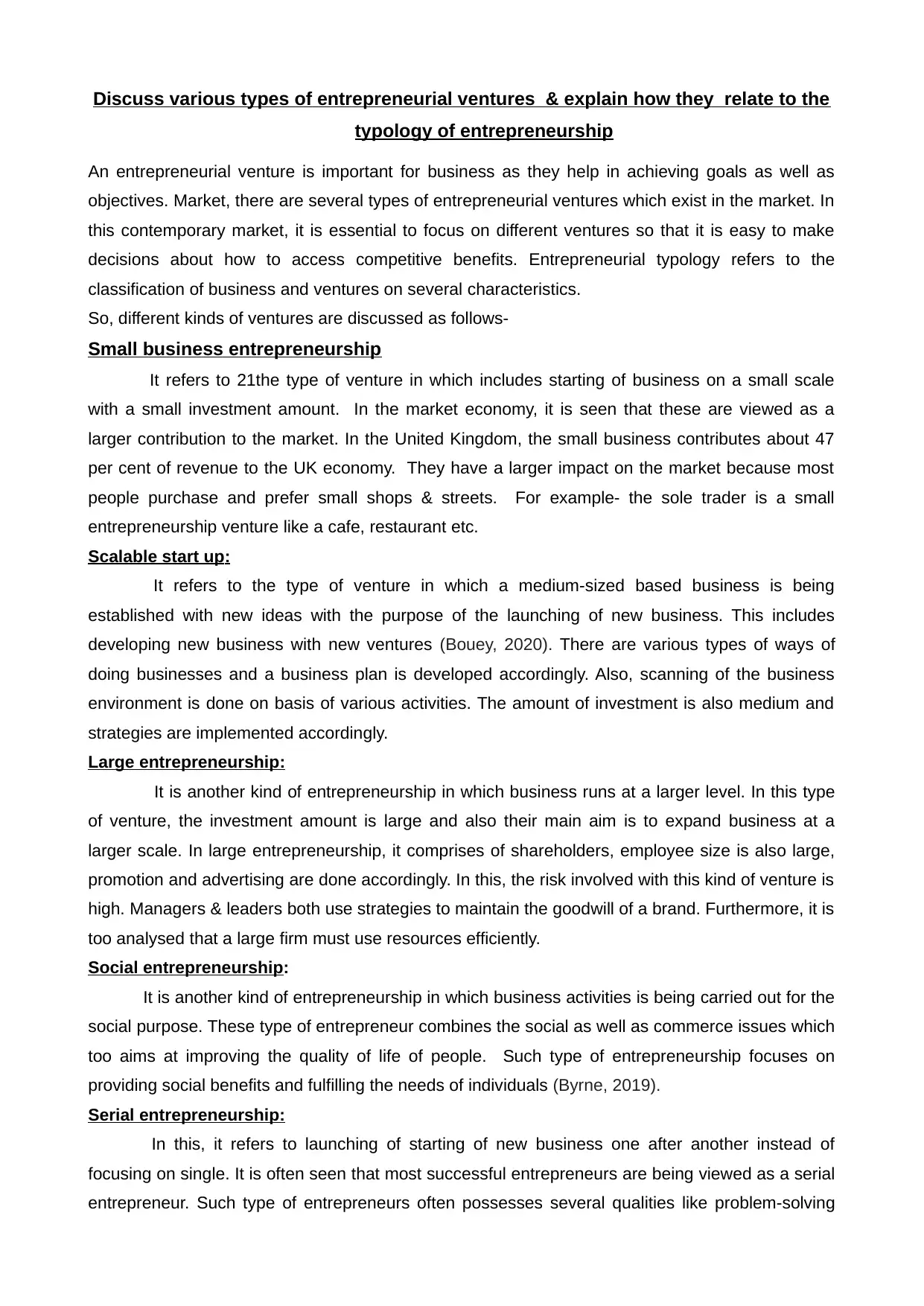
Discuss various types of entrepreneurial ventures & explain how they relate to the
typology of entrepreneurship
An entrepreneurial venture is important for business as they help in achieving goals as well as
objectives. Market, there are several types of entrepreneurial ventures which exist in the market. In
this contemporary market, it is essential to focus on different ventures so that it is easy to make
decisions about how to access competitive benefits. Entrepreneurial typology refers to the
classification of business and ventures on several characteristics.
So, different kinds of ventures are discussed as follows-
Small business entrepreneurship
It refers to 21the type of venture in which includes starting of business on a small scale
with a small investment amount. In the market economy, it is seen that these are viewed as a
larger contribution to the market. In the United Kingdom, the small business contributes about 47
per cent of revenue to the UK economy. They have a larger impact on the market because most
people purchase and prefer small shops & streets. For example- the sole trader is a small
entrepreneurship venture like a cafe, restaurant etc.
Scalable start up:
It refers to the type of venture in which a medium-sized based business is being
established with new ideas with the purpose of the launching of new business. This includes
developing new business with new ventures (Bouey, 2020). There are various types of ways of
doing businesses and a business plan is developed accordingly. Also, scanning of the business
environment is done on basis of various activities. The amount of investment is also medium and
strategies are implemented accordingly.
Large entrepreneurship:
It is another kind of entrepreneurship in which business runs at a larger level. In this type
of venture, the investment amount is large and also their main aim is to expand business at a
larger scale. In large entrepreneurship, it comprises of shareholders, employee size is also large,
promotion and advertising are done accordingly. In this, the risk involved with this kind of venture is
high. Managers & leaders both use strategies to maintain the goodwill of a brand. Furthermore, it is
too analysed that a large firm must use resources efficiently.
Social entrepreneurship:
It is another kind of entrepreneurship in which business activities is being carried out for the
social purpose. These type of entrepreneur combines the social as well as commerce issues which
too aims at improving the quality of life of people. Such type of entrepreneurship focuses on
providing social benefits and fulfilling the needs of individuals (Byrne, 2019).
Serial entrepreneurship:
In this, it refers to launching of starting of new business one after another instead of
focusing on single. It is often seen that most successful entrepreneurs are being viewed as a serial
entrepreneur. Such type of entrepreneurs often possesses several qualities like problem-solving
typology of entrepreneurship
An entrepreneurial venture is important for business as they help in achieving goals as well as
objectives. Market, there are several types of entrepreneurial ventures which exist in the market. In
this contemporary market, it is essential to focus on different ventures so that it is easy to make
decisions about how to access competitive benefits. Entrepreneurial typology refers to the
classification of business and ventures on several characteristics.
So, different kinds of ventures are discussed as follows-
Small business entrepreneurship
It refers to 21the type of venture in which includes starting of business on a small scale
with a small investment amount. In the market economy, it is seen that these are viewed as a
larger contribution to the market. In the United Kingdom, the small business contributes about 47
per cent of revenue to the UK economy. They have a larger impact on the market because most
people purchase and prefer small shops & streets. For example- the sole trader is a small
entrepreneurship venture like a cafe, restaurant etc.
Scalable start up:
It refers to the type of venture in which a medium-sized based business is being
established with new ideas with the purpose of the launching of new business. This includes
developing new business with new ventures (Bouey, 2020). There are various types of ways of
doing businesses and a business plan is developed accordingly. Also, scanning of the business
environment is done on basis of various activities. The amount of investment is also medium and
strategies are implemented accordingly.
Large entrepreneurship:
It is another kind of entrepreneurship in which business runs at a larger level. In this type
of venture, the investment amount is large and also their main aim is to expand business at a
larger scale. In large entrepreneurship, it comprises of shareholders, employee size is also large,
promotion and advertising are done accordingly. In this, the risk involved with this kind of venture is
high. Managers & leaders both use strategies to maintain the goodwill of a brand. Furthermore, it is
too analysed that a large firm must use resources efficiently.
Social entrepreneurship:
It is another kind of entrepreneurship in which business activities is being carried out for the
social purpose. These type of entrepreneur combines the social as well as commerce issues which
too aims at improving the quality of life of people. Such type of entrepreneurship focuses on
providing social benefits and fulfilling the needs of individuals (Byrne, 2019).
Serial entrepreneurship:
In this, it refers to launching of starting of new business one after another instead of
focusing on single. It is often seen that most successful entrepreneurs are being viewed as a serial
entrepreneur. Such type of entrepreneurs often possesses several qualities like problem-solving
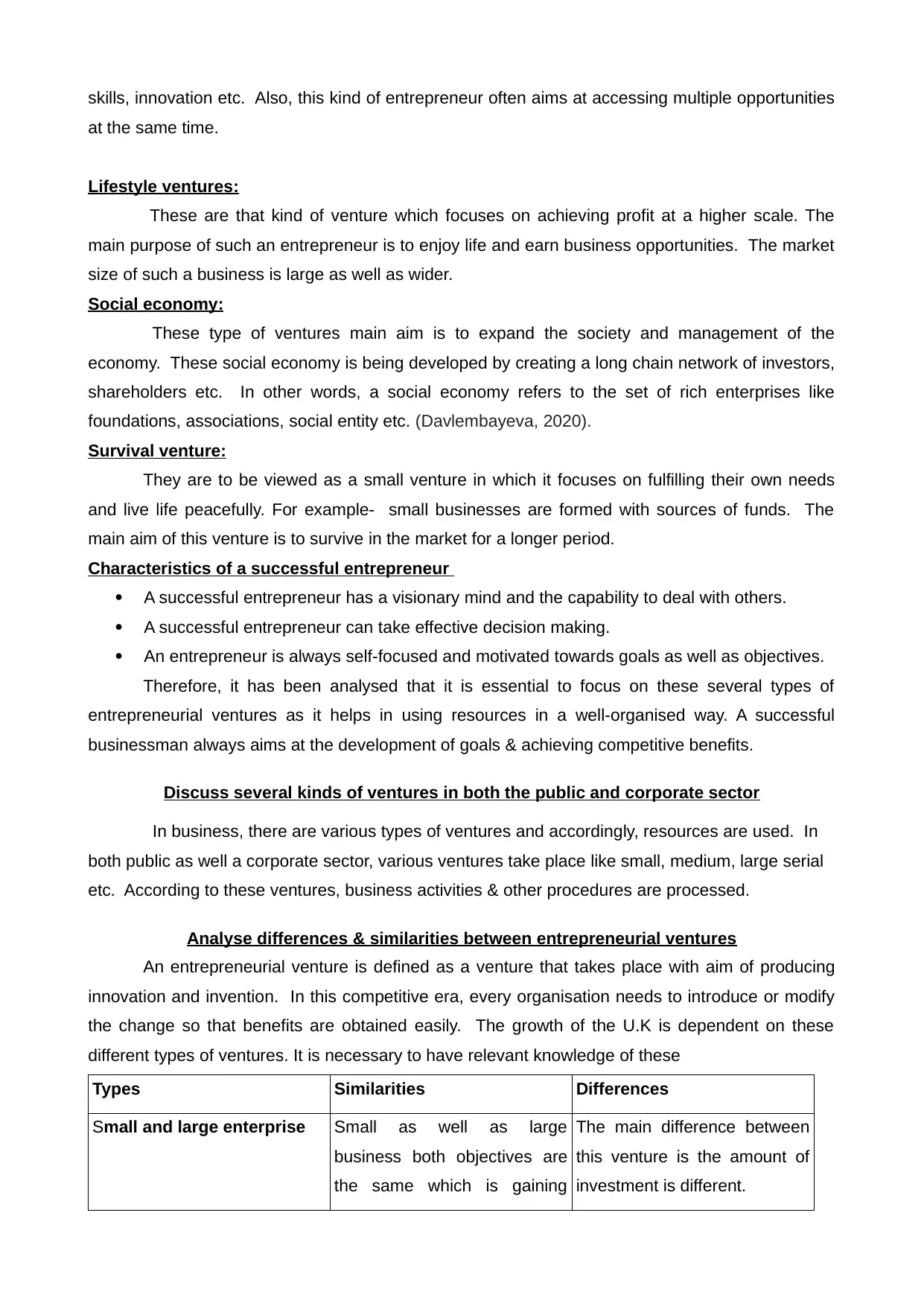
skills, innovation etc. Also, this kind of entrepreneur often aims at accessing multiple opportunities
at the same time.
Lifestyle ventures:
These are that kind of venture which focuses on achieving profit at a higher scale. The
main purpose of such an entrepreneur is to enjoy life and earn business opportunities. The market
size of such a business is large as well as wider.
Social economy:
These type of ventures main aim is to expand the society and management of the
economy. These social economy is being developed by creating a long chain network of investors,
shareholders etc. In other words, a social economy refers to the set of rich enterprises like
foundations, associations, social entity etc. (Davlembayeva, 2020).
Survival venture:
They are to be viewed as a small venture in which it focuses on fulfilling their own needs
and live life peacefully. For example- small businesses are formed with sources of funds. The
main aim of this venture is to survive in the market for a longer period.
Characteristics of a successful entrepreneur
A successful entrepreneur has a visionary mind and the capability to deal with others.
A successful entrepreneur can take effective decision making.
An entrepreneur is always self-focused and motivated towards goals as well as objectives.
Therefore, it has been analysed that it is essential to focus on these several types of
entrepreneurial ventures as it helps in using resources in a well-organised way. A successful
businessman always aims at the development of goals & achieving competitive benefits.
Discuss several kinds of ventures in both the public and corporate sector
In business, there are various types of ventures and accordingly, resources are used. In
both public as well a corporate sector, various ventures take place like small, medium, large serial
etc. According to these ventures, business activities & other procedures are processed.
Analyse differences & similarities between entrepreneurial ventures
An entrepreneurial venture is defined as a venture that takes place with aim of producing
innovation and invention. In this competitive era, every organisation needs to introduce or modify
the change so that benefits are obtained easily. The growth of the U.K is dependent on these
different types of ventures. It is necessary to have relevant knowledge of these
Types Similarities Differences
Small and large enterprise Small as well as large
business both objectives are
the same which is gaining
The main difference between
this venture is the amount of
investment is different.
at the same time.
Lifestyle ventures:
These are that kind of venture which focuses on achieving profit at a higher scale. The
main purpose of such an entrepreneur is to enjoy life and earn business opportunities. The market
size of such a business is large as well as wider.
Social economy:
These type of ventures main aim is to expand the society and management of the
economy. These social economy is being developed by creating a long chain network of investors,
shareholders etc. In other words, a social economy refers to the set of rich enterprises like
foundations, associations, social entity etc. (Davlembayeva, 2020).
Survival venture:
They are to be viewed as a small venture in which it focuses on fulfilling their own needs
and live life peacefully. For example- small businesses are formed with sources of funds. The
main aim of this venture is to survive in the market for a longer period.
Characteristics of a successful entrepreneur
A successful entrepreneur has a visionary mind and the capability to deal with others.
A successful entrepreneur can take effective decision making.
An entrepreneur is always self-focused and motivated towards goals as well as objectives.
Therefore, it has been analysed that it is essential to focus on these several types of
entrepreneurial ventures as it helps in using resources in a well-organised way. A successful
businessman always aims at the development of goals & achieving competitive benefits.
Discuss several kinds of ventures in both the public and corporate sector
In business, there are various types of ventures and accordingly, resources are used. In
both public as well a corporate sector, various ventures take place like small, medium, large serial
etc. According to these ventures, business activities & other procedures are processed.
Analyse differences & similarities between entrepreneurial ventures
An entrepreneurial venture is defined as a venture that takes place with aim of producing
innovation and invention. In this competitive era, every organisation needs to introduce or modify
the change so that benefits are obtained easily. The growth of the U.K is dependent on these
different types of ventures. It is necessary to have relevant knowledge of these
Types Similarities Differences
Small and large enterprise Small as well as large
business both objectives are
the same which is gaining
The main difference between
this venture is the amount of
investment is different.
⊘ This is a preview!⊘
Do you want full access?
Subscribe today to unlock all pages.

Trusted by 1+ million students worldwide
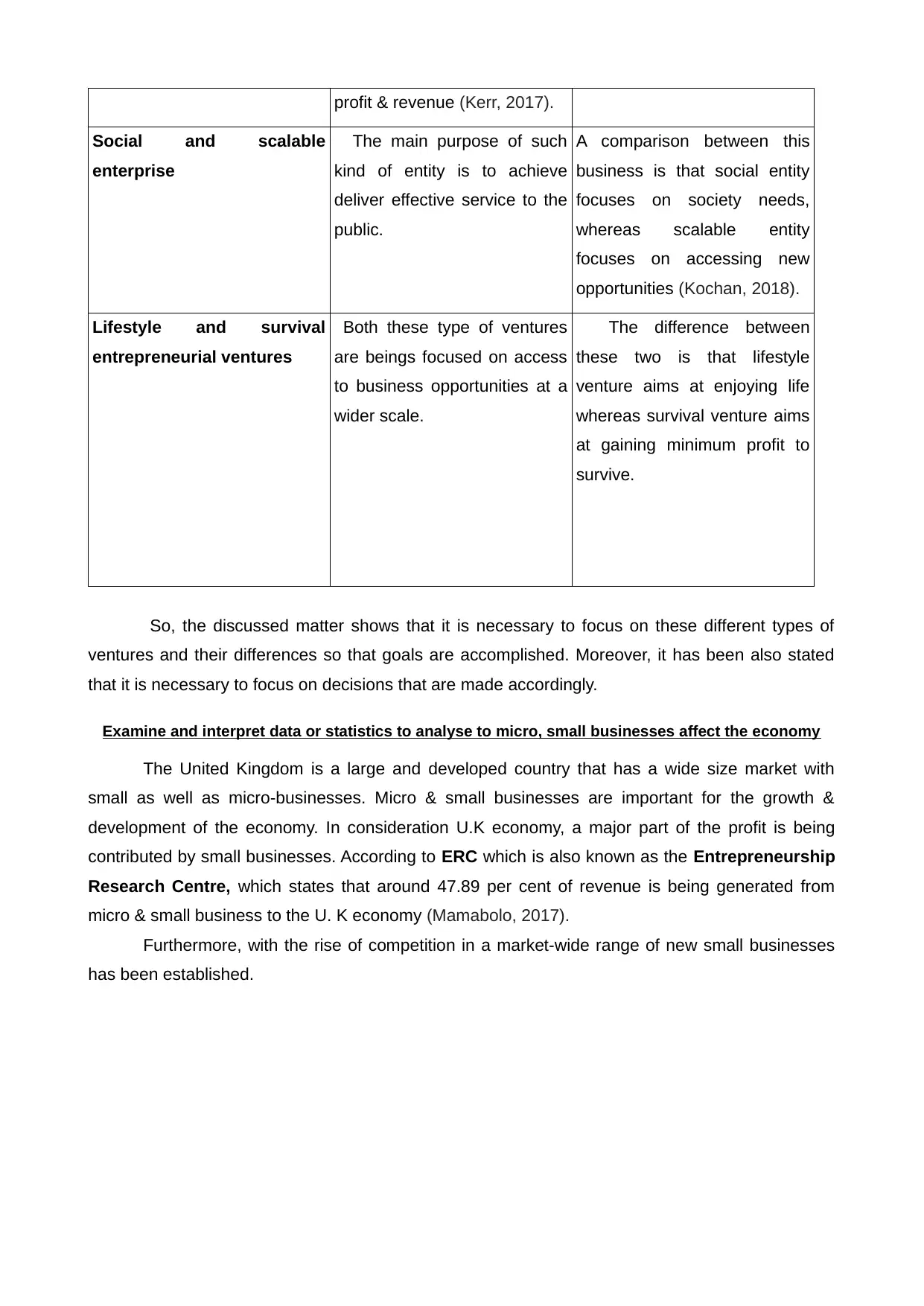
profit & revenue (Kerr, 2017).
Social and scalable
enterprise
The main purpose of such
kind of entity is to achieve
deliver effective service to the
public.
A comparison between this
business is that social entity
focuses on society needs,
whereas scalable entity
focuses on accessing new
opportunities (Kochan, 2018).
Lifestyle and survival
entrepreneurial ventures
Both these type of ventures
are beings focused on access
to business opportunities at a
wider scale.
The difference between
these two is that lifestyle
venture aims at enjoying life
whereas survival venture aims
at gaining minimum profit to
survive.
So, the discussed matter shows that it is necessary to focus on these different types of
ventures and their differences so that goals are accomplished. Moreover, it has been also stated
that it is necessary to focus on decisions that are made accordingly.
Examine and interpret data or statistics to analyse to micro, small businesses affect the economy
The United Kingdom is a large and developed country that has a wide size market with
small as well as micro-businesses. Micro & small businesses are important for the growth &
development of the economy. In consideration U.K economy, a major part of the profit is being
contributed by small businesses. According to ERC which is also known as the Entrepreneurship
Research Centre, which states that around 47.89 per cent of revenue is being generated from
micro & small business to the U. K economy (Mamabolo, 2017).
Furthermore, with the rise of competition in a market-wide range of new small businesses
has been established.
Social and scalable
enterprise
The main purpose of such
kind of entity is to achieve
deliver effective service to the
public.
A comparison between this
business is that social entity
focuses on society needs,
whereas scalable entity
focuses on accessing new
opportunities (Kochan, 2018).
Lifestyle and survival
entrepreneurial ventures
Both these type of ventures
are beings focused on access
to business opportunities at a
wider scale.
The difference between
these two is that lifestyle
venture aims at enjoying life
whereas survival venture aims
at gaining minimum profit to
survive.
So, the discussed matter shows that it is necessary to focus on these different types of
ventures and their differences so that goals are accomplished. Moreover, it has been also stated
that it is necessary to focus on decisions that are made accordingly.
Examine and interpret data or statistics to analyse to micro, small businesses affect the economy
The United Kingdom is a large and developed country that has a wide size market with
small as well as micro-businesses. Micro & small businesses are important for the growth &
development of the economy. In consideration U.K economy, a major part of the profit is being
contributed by small businesses. According to ERC which is also known as the Entrepreneurship
Research Centre, which states that around 47.89 per cent of revenue is being generated from
micro & small business to the U. K economy (Mamabolo, 2017).
Furthermore, with the rise of competition in a market-wide range of new small businesses
has been established.
Paraphrase This Document
Need a fresh take? Get an instant paraphrase of this document with our AI Paraphraser
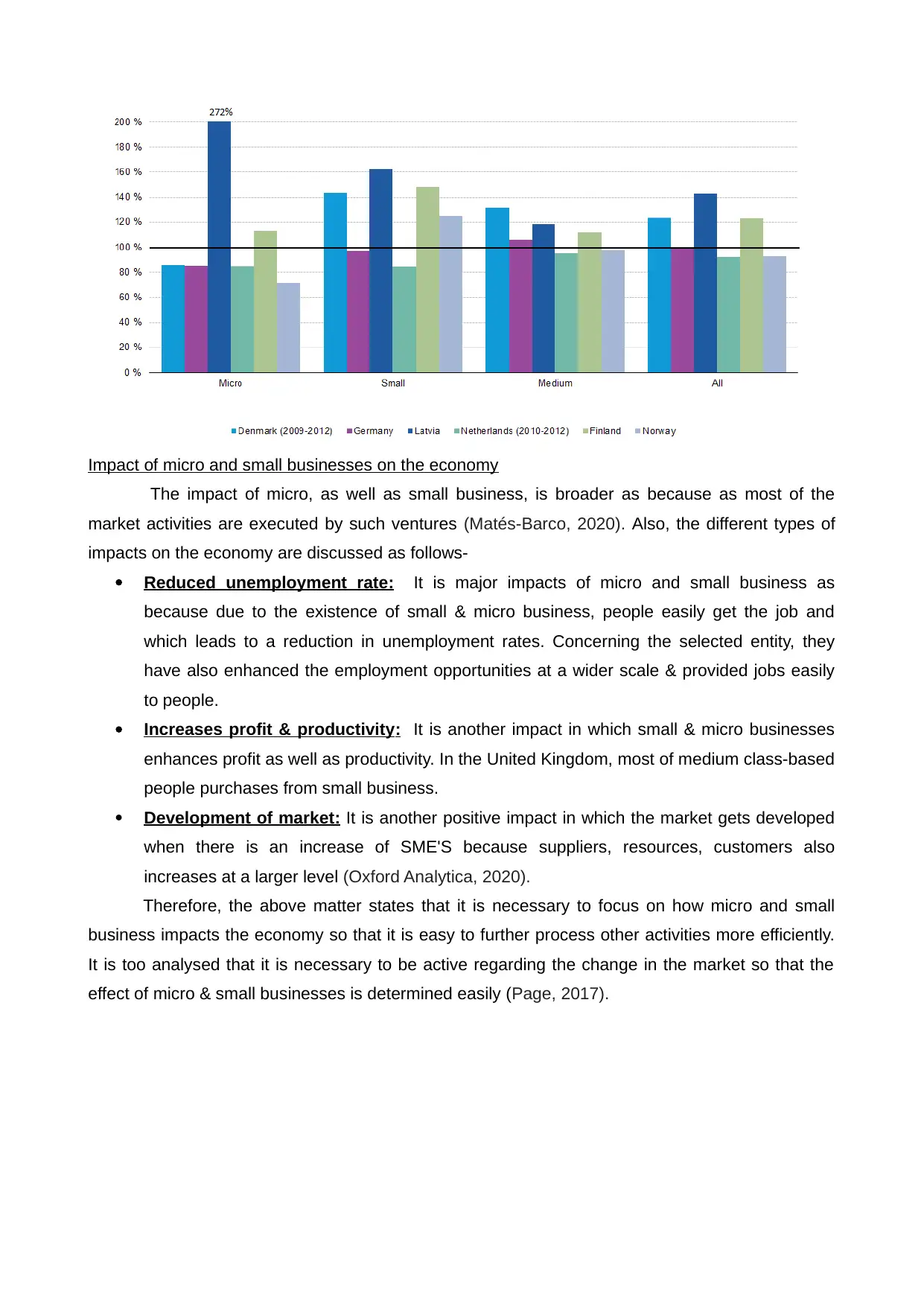
Impact of micro and small businesses on the economy
The impact of micro, as well as small business, is broader as because as most of the
market activities are executed by such ventures (Matés-Barco, 2020). Also, the different types of
impacts on the economy are discussed as follows-
Reduced unemployment rate: It is major impacts of micro and small business as
because due to the existence of small & micro business, people easily get the job and
which leads to a reduction in unemployment rates. Concerning the selected entity, they
have also enhanced the employment opportunities at a wider scale & provided jobs easily
to people.
Increases profit & productivity: It is another impact in which small & micro businesses
enhances profit as well as productivity. In the United Kingdom, most of medium class-based
people purchases from small business.
Development of market: It is another positive impact in which the market gets developed
when there is an increase of SME'S because suppliers, resources, customers also
increases at a larger level (Oxford Analytica, 2020).
Therefore, the above matter states that it is necessary to focus on how micro and small
business impacts the economy so that it is easy to further process other activities more efficiently.
It is too analysed that it is necessary to be active regarding the change in the market so that the
effect of micro & small businesses is determined easily (Page, 2017).
The impact of micro, as well as small business, is broader as because as most of the
market activities are executed by such ventures (Matés-Barco, 2020). Also, the different types of
impacts on the economy are discussed as follows-
Reduced unemployment rate: It is major impacts of micro and small business as
because due to the existence of small & micro business, people easily get the job and
which leads to a reduction in unemployment rates. Concerning the selected entity, they
have also enhanced the employment opportunities at a wider scale & provided jobs easily
to people.
Increases profit & productivity: It is another impact in which small & micro businesses
enhances profit as well as productivity. In the United Kingdom, most of medium class-based
people purchases from small business.
Development of market: It is another positive impact in which the market gets developed
when there is an increase of SME'S because suppliers, resources, customers also
increases at a larger level (Oxford Analytica, 2020).
Therefore, the above matter states that it is necessary to focus on how micro and small
business impacts the economy so that it is easy to further process other activities more efficiently.
It is too analysed that it is necessary to be active regarding the change in the market so that the
effect of micro & small businesses is determined easily (Page, 2017).
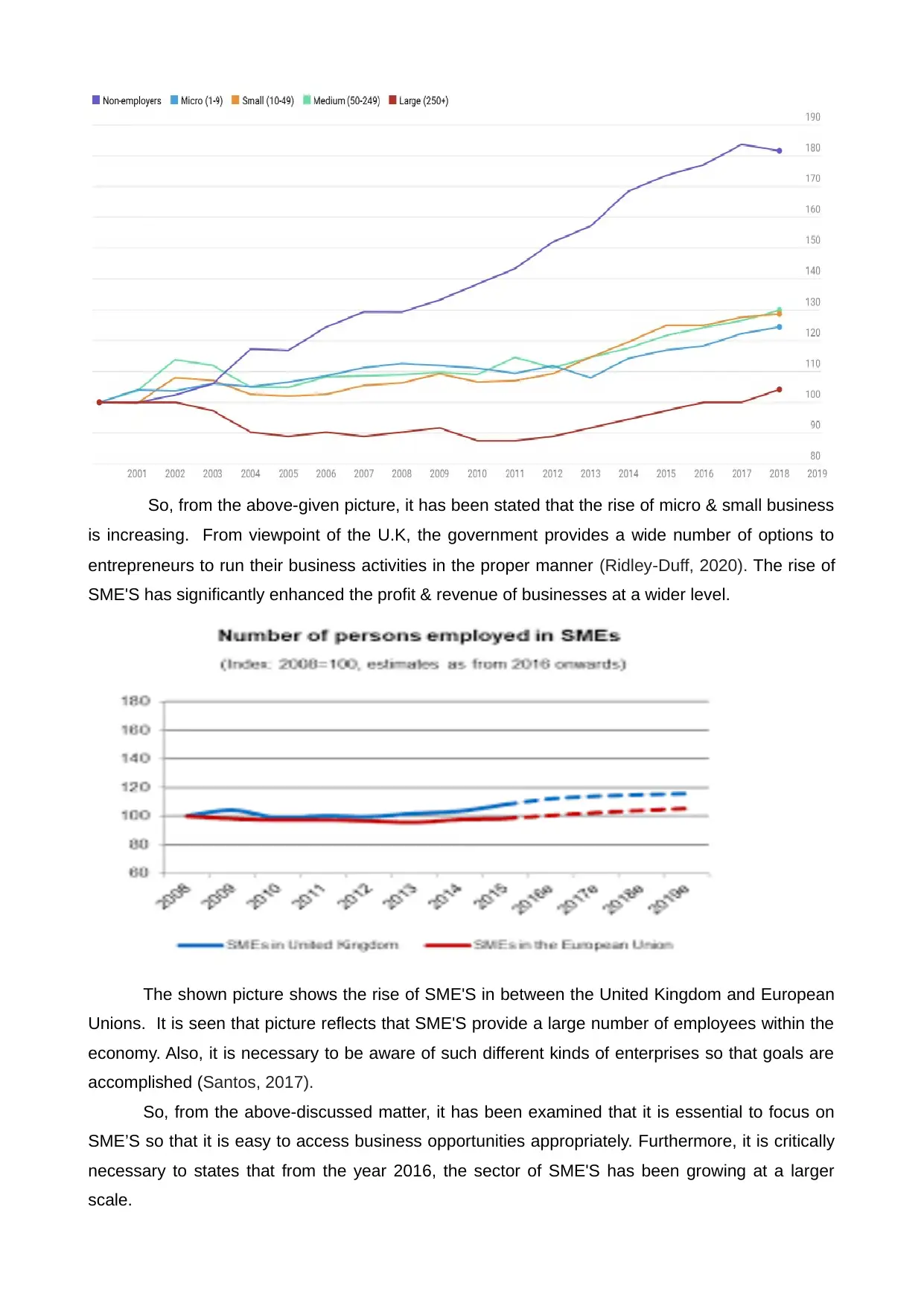
So, from the above-given picture, it has been stated that the rise of micro & small business
is increasing. From viewpoint of the U.K, the government provides a wide number of options to
entrepreneurs to run their business activities in the proper manner (Ridley‐Duff, 2020). The rise of
SME'S has significantly enhanced the profit & revenue of businesses at a wider level.
The shown picture shows the rise of SME'S in between the United Kingdom and European
Unions. It is seen that picture reflects that SME'S provide a large number of employees within the
economy. Also, it is necessary to be aware of such different kinds of enterprises so that goals are
accomplished (Santos, 2017).
So, from the above-discussed matter, it has been examined that it is essential to focus on
SME’S so that it is easy to access business opportunities appropriately. Furthermore, it is critically
necessary to states that from the year 2016, the sector of SME'S has been growing at a larger
scale.
is increasing. From viewpoint of the U.K, the government provides a wide number of options to
entrepreneurs to run their business activities in the proper manner (Ridley‐Duff, 2020). The rise of
SME'S has significantly enhanced the profit & revenue of businesses at a wider level.
The shown picture shows the rise of SME'S in between the United Kingdom and European
Unions. It is seen that picture reflects that SME'S provide a large number of employees within the
economy. Also, it is necessary to be aware of such different kinds of enterprises so that goals are
accomplished (Santos, 2017).
So, from the above-discussed matter, it has been examined that it is essential to focus on
SME’S so that it is easy to access business opportunities appropriately. Furthermore, it is critically
necessary to states that from the year 2016, the sector of SME'S has been growing at a larger
scale.
⊘ This is a preview!⊘
Do you want full access?
Subscribe today to unlock all pages.

Trusted by 1+ million students worldwide
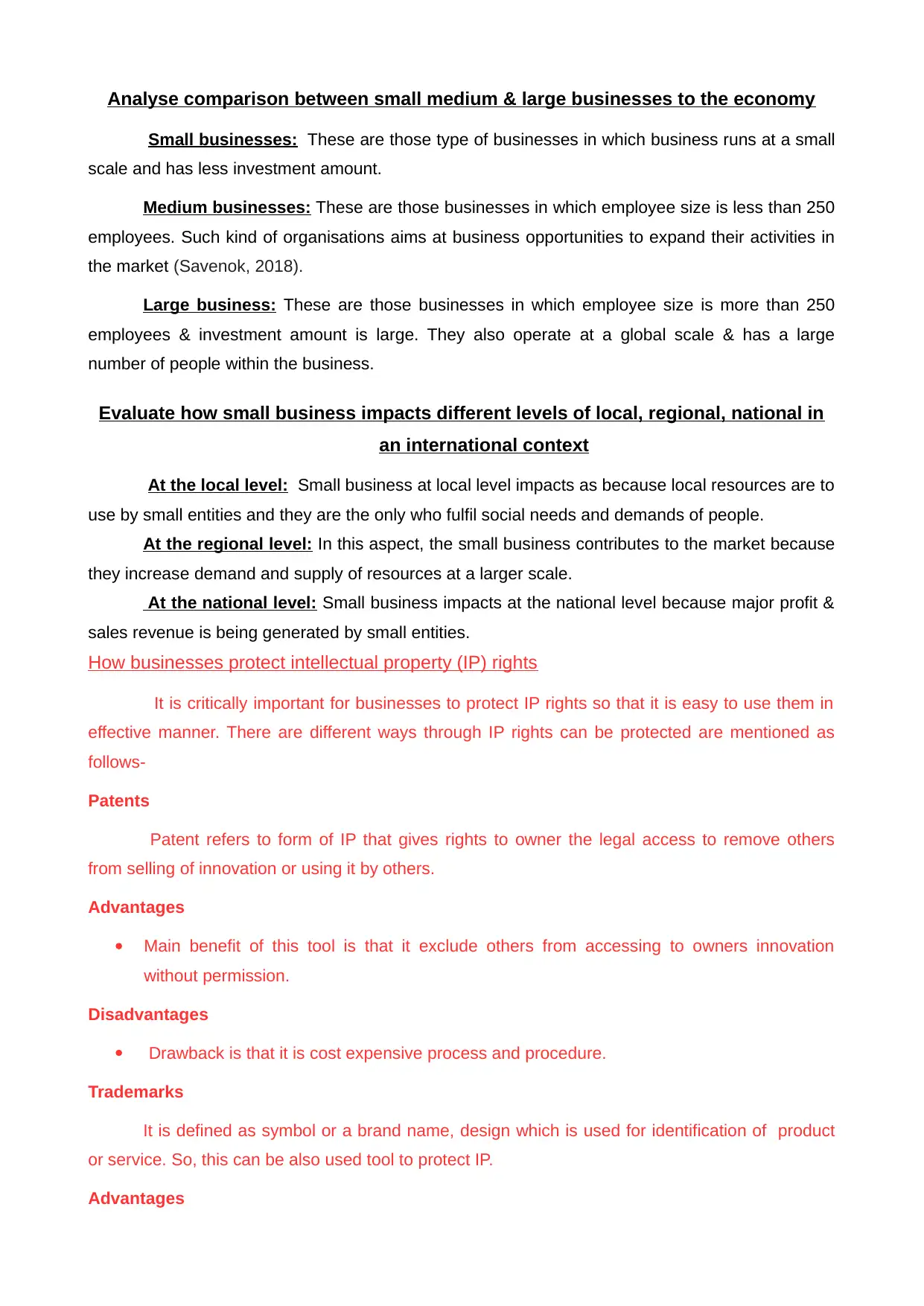
Analyse comparison between small medium & large businesses to the economy
Small businesses: These are those type of businesses in which business runs at a small
scale and has less investment amount.
Medium businesses: These are those businesses in which employee size is less than 250
employees. Such kind of organisations aims at business opportunities to expand their activities in
the market (Savenok, 2018).
Large business: These are those businesses in which employee size is more than 250
employees & investment amount is large. They also operate at a global scale & has a large
number of people within the business.
Evaluate how small business impacts different levels of local, regional, national in
an international context
At the local level: Small business at local level impacts as because local resources are to
use by small entities and they are the only who fulfil social needs and demands of people.
At the regional level: In this aspect, the small business contributes to the market because
they increase demand and supply of resources at a larger scale.
At the national level: Small business impacts at the national level because major profit &
sales revenue is being generated by small entities.
How businesses protect intellectual property (IP) rights
It is critically important for businesses to protect IP rights so that it is easy to use them in
effective manner. There are different ways through IP rights can be protected are mentioned as
follows-
Patents
Patent refers to form of IP that gives rights to owner the legal access to remove others
from selling of innovation or using it by others.
Advantages
Main benefit of this tool is that it exclude others from accessing to owners innovation
without permission.
Disadvantages
Drawback is that it is cost expensive process and procedure.
Trademarks
It is defined as symbol or a brand name, design which is used for identification of product
or service. So, this can be also used tool to protect IP.
Advantages
Small businesses: These are those type of businesses in which business runs at a small
scale and has less investment amount.
Medium businesses: These are those businesses in which employee size is less than 250
employees. Such kind of organisations aims at business opportunities to expand their activities in
the market (Savenok, 2018).
Large business: These are those businesses in which employee size is more than 250
employees & investment amount is large. They also operate at a global scale & has a large
number of people within the business.
Evaluate how small business impacts different levels of local, regional, national in
an international context
At the local level: Small business at local level impacts as because local resources are to
use by small entities and they are the only who fulfil social needs and demands of people.
At the regional level: In this aspect, the small business contributes to the market because
they increase demand and supply of resources at a larger scale.
At the national level: Small business impacts at the national level because major profit &
sales revenue is being generated by small entities.
How businesses protect intellectual property (IP) rights
It is critically important for businesses to protect IP rights so that it is easy to use them in
effective manner. There are different ways through IP rights can be protected are mentioned as
follows-
Patents
Patent refers to form of IP that gives rights to owner the legal access to remove others
from selling of innovation or using it by others.
Advantages
Main benefit of this tool is that it exclude others from accessing to owners innovation
without permission.
Disadvantages
Drawback is that it is cost expensive process and procedure.
Trademarks
It is defined as symbol or a brand name, design which is used for identification of product
or service. So, this can be also used tool to protect IP.
Advantages
Paraphrase This Document
Need a fresh take? Get an instant paraphrase of this document with our AI Paraphraser
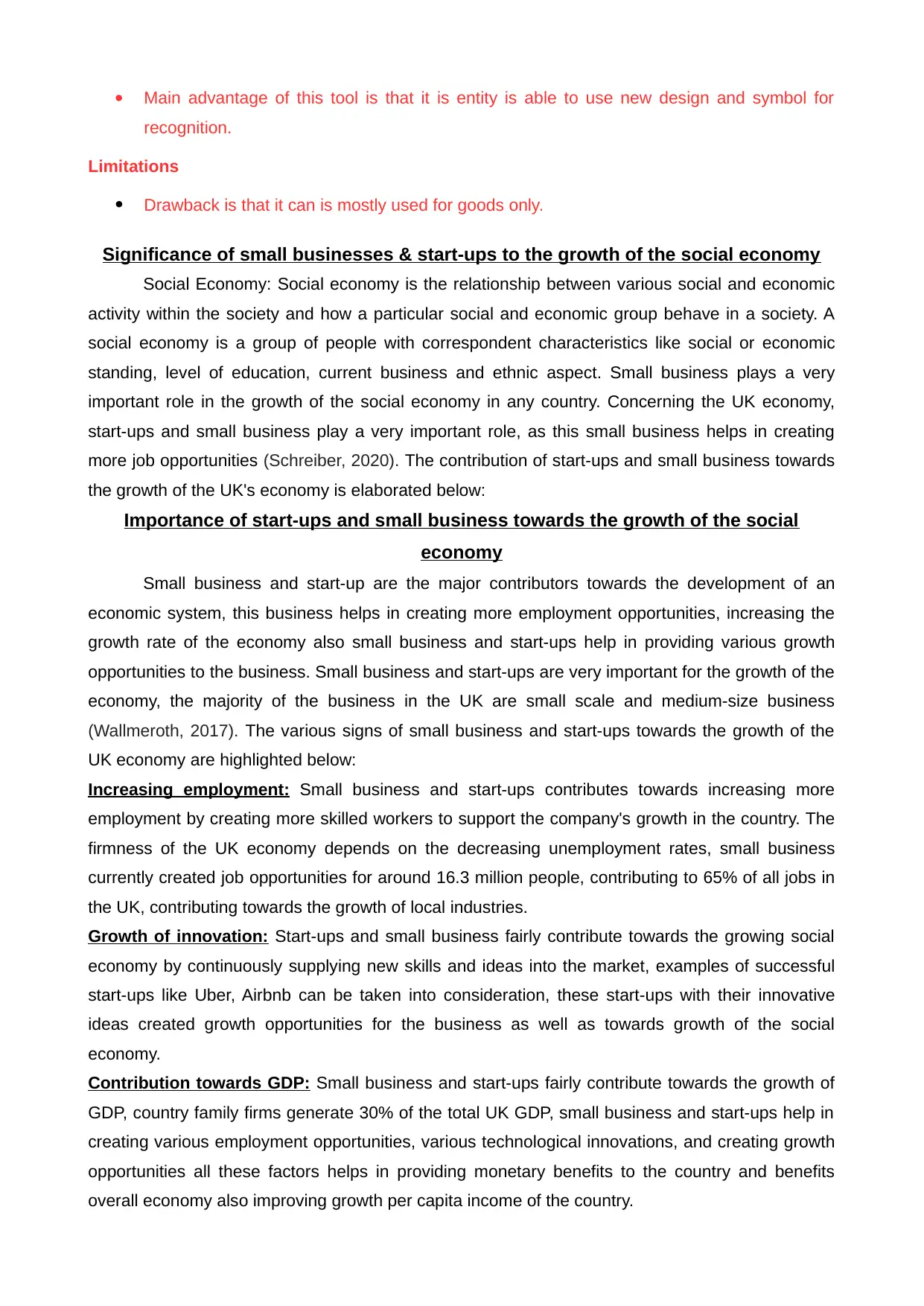
Main advantage of this tool is that it is entity is able to use new design and symbol for
recognition.
Limitations
Drawback is that it can is mostly used for goods only.
Significance of small businesses & start-ups to the growth of the social economy
Social Economy: Social economy is the relationship between various social and economic
activity within the society and how a particular social and economic group behave in a society. A
social economy is a group of people with correspondent characteristics like social or economic
standing, level of education, current business and ethnic aspect. Small business plays a very
important role in the growth of the social economy in any country. Concerning the UK economy,
start-ups and small business play a very important role, as this small business helps in creating
more job opportunities (Schreiber, 2020). The contribution of start-ups and small business towards
the growth of the UK's economy is elaborated below:
Importance of start-ups and small business towards the growth of the social
economy
Small business and start-up are the major contributors towards the development of an
economic system, this business helps in creating more employment opportunities, increasing the
growth rate of the economy also small business and start-ups help in providing various growth
opportunities to the business. Small business and start-ups are very important for the growth of the
economy, the majority of the business in the UK are small scale and medium-size business
(Wallmeroth, 2017). The various signs of small business and start-ups towards the growth of the
UK economy are highlighted below:
Increasing employment: Small business and start-ups contributes towards increasing more
employment by creating more skilled workers to support the company's growth in the country. The
firmness of the UK economy depends on the decreasing unemployment rates, small business
currently created job opportunities for around 16.3 million people, contributing to 65% of all jobs in
the UK, contributing towards the growth of local industries.
Growth of innovation: Start-ups and small business fairly contribute towards the growing social
economy by continuously supplying new skills and ideas into the market, examples of successful
start-ups like Uber, Airbnb can be taken into consideration, these start-ups with their innovative
ideas created growth opportunities for the business as well as towards growth of the social
economy.
Contribution towards GDP: Small business and start-ups fairly contribute towards the growth of
GDP, country family firms generate 30% of the total UK GDP, small business and start-ups help in
creating various employment opportunities, various technological innovations, and creating growth
opportunities all these factors helps in providing monetary benefits to the country and benefits
overall economy also improving growth per capita income of the country.
recognition.
Limitations
Drawback is that it can is mostly used for goods only.
Significance of small businesses & start-ups to the growth of the social economy
Social Economy: Social economy is the relationship between various social and economic
activity within the society and how a particular social and economic group behave in a society. A
social economy is a group of people with correspondent characteristics like social or economic
standing, level of education, current business and ethnic aspect. Small business plays a very
important role in the growth of the social economy in any country. Concerning the UK economy,
start-ups and small business play a very important role, as this small business helps in creating
more job opportunities (Schreiber, 2020). The contribution of start-ups and small business towards
the growth of the UK's economy is elaborated below:
Importance of start-ups and small business towards the growth of the social
economy
Small business and start-up are the major contributors towards the development of an
economic system, this business helps in creating more employment opportunities, increasing the
growth rate of the economy also small business and start-ups help in providing various growth
opportunities to the business. Small business and start-ups are very important for the growth of the
economy, the majority of the business in the UK are small scale and medium-size business
(Wallmeroth, 2017). The various signs of small business and start-ups towards the growth of the
UK economy are highlighted below:
Increasing employment: Small business and start-ups contributes towards increasing more
employment by creating more skilled workers to support the company's growth in the country. The
firmness of the UK economy depends on the decreasing unemployment rates, small business
currently created job opportunities for around 16.3 million people, contributing to 65% of all jobs in
the UK, contributing towards the growth of local industries.
Growth of innovation: Start-ups and small business fairly contribute towards the growing social
economy by continuously supplying new skills and ideas into the market, examples of successful
start-ups like Uber, Airbnb can be taken into consideration, these start-ups with their innovative
ideas created growth opportunities for the business as well as towards growth of the social
economy.
Contribution towards GDP: Small business and start-ups fairly contribute towards the growth of
GDP, country family firms generate 30% of the total UK GDP, small business and start-ups help in
creating various employment opportunities, various technological innovations, and creating growth
opportunities all these factors helps in providing monetary benefits to the country and benefits
overall economy also improving growth per capita income of the country.
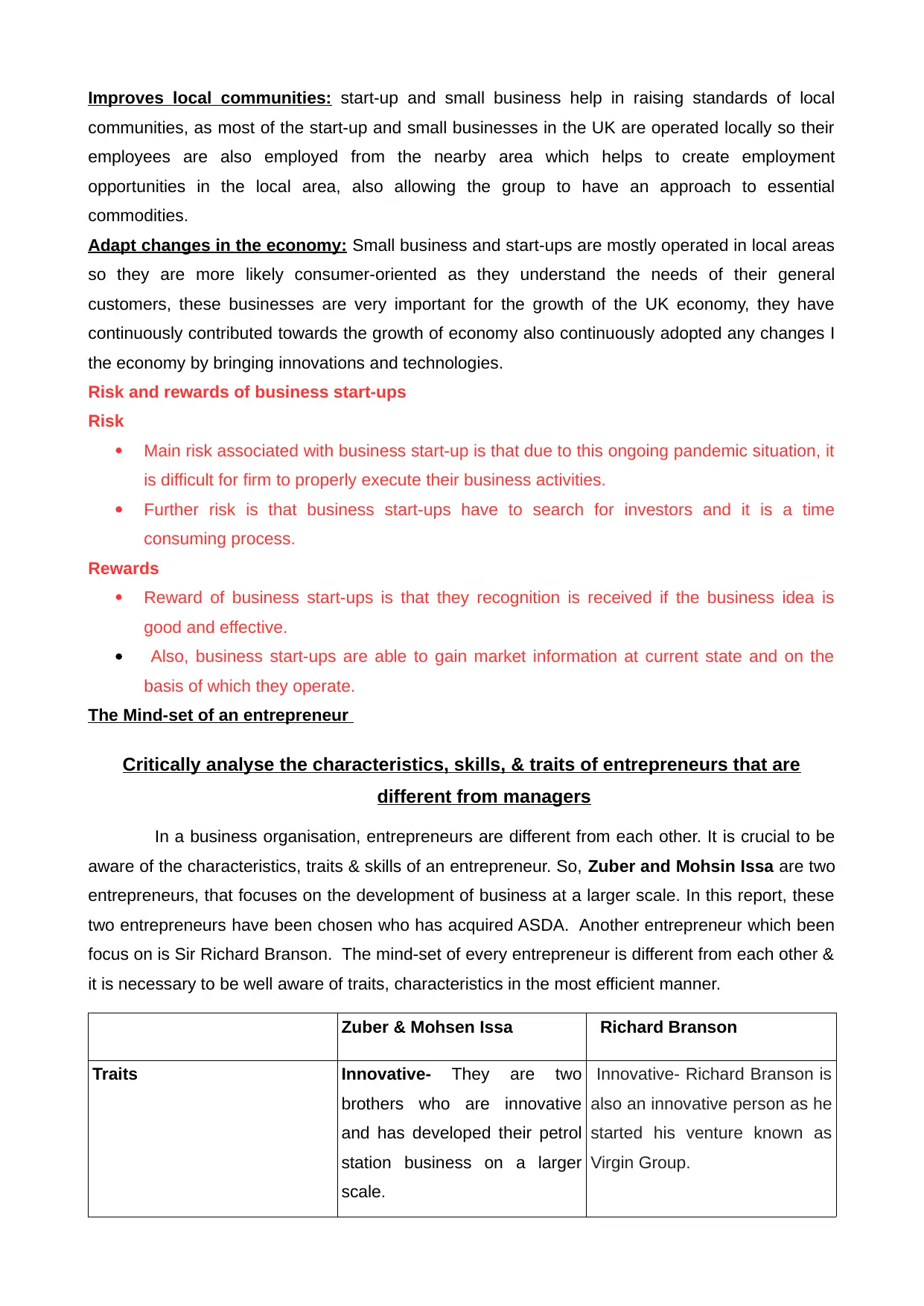
Improves local communities: start-up and small business help in raising standards of local
communities, as most of the start-up and small businesses in the UK are operated locally so their
employees are also employed from the nearby area which helps to create employment
opportunities in the local area, also allowing the group to have an approach to essential
commodities.
Adapt changes in the economy: Small business and start-ups are mostly operated in local areas
so they are more likely consumer-oriented as they understand the needs of their general
customers, these businesses are very important for the growth of the UK economy, they have
continuously contributed towards the growth of economy also continuously adopted any changes I
the economy by bringing innovations and technologies.
Risk and rewards of business start-ups
Risk
Main risk associated with business start-up is that due to this ongoing pandemic situation, it
is difficult for firm to properly execute their business activities.
Further risk is that business start-ups have to search for investors and it is a time
consuming process.
Rewards
Reward of business start-ups is that they recognition is received if the business idea is
good and effective.
Also, business start-ups are able to gain market information at current state and on the
basis of which they operate.
The Mind-set of an entrepreneur
Critically analyse the characteristics, skills, & traits of entrepreneurs that are
different from managers
In a business organisation, entrepreneurs are different from each other. It is crucial to be
aware of the characteristics, traits & skills of an entrepreneur. So, Zuber and Mohsin Issa are two
entrepreneurs, that focuses on the development of business at a larger scale. In this report, these
two entrepreneurs have been chosen who has acquired ASDA. Another entrepreneur which been
focus on is Sir Richard Branson. The mind-set of every entrepreneur is different from each other &
it is necessary to be well aware of traits, characteristics in the most efficient manner.
Zuber & Mohsen Issa Richard Branson
Traits Innovative- They are two
brothers who are innovative
and has developed their petrol
station business on a larger
scale.
Innovative- Richard Branson is
also an innovative person as he
started his venture known as
Virgin Group.
communities, as most of the start-up and small businesses in the UK are operated locally so their
employees are also employed from the nearby area which helps to create employment
opportunities in the local area, also allowing the group to have an approach to essential
commodities.
Adapt changes in the economy: Small business and start-ups are mostly operated in local areas
so they are more likely consumer-oriented as they understand the needs of their general
customers, these businesses are very important for the growth of the UK economy, they have
continuously contributed towards the growth of economy also continuously adopted any changes I
the economy by bringing innovations and technologies.
Risk and rewards of business start-ups
Risk
Main risk associated with business start-up is that due to this ongoing pandemic situation, it
is difficult for firm to properly execute their business activities.
Further risk is that business start-ups have to search for investors and it is a time
consuming process.
Rewards
Reward of business start-ups is that they recognition is received if the business idea is
good and effective.
Also, business start-ups are able to gain market information at current state and on the
basis of which they operate.
The Mind-set of an entrepreneur
Critically analyse the characteristics, skills, & traits of entrepreneurs that are
different from managers
In a business organisation, entrepreneurs are different from each other. It is crucial to be
aware of the characteristics, traits & skills of an entrepreneur. So, Zuber and Mohsin Issa are two
entrepreneurs, that focuses on the development of business at a larger scale. In this report, these
two entrepreneurs have been chosen who has acquired ASDA. Another entrepreneur which been
focus on is Sir Richard Branson. The mind-set of every entrepreneur is different from each other &
it is necessary to be well aware of traits, characteristics in the most efficient manner.
Zuber & Mohsen Issa Richard Branson
Traits Innovative- They are two
brothers who are innovative
and has developed their petrol
station business on a larger
scale.
Innovative- Richard Branson is
also an innovative person as he
started his venture known as
Virgin Group.
⊘ This is a preview!⊘
Do you want full access?
Subscribe today to unlock all pages.

Trusted by 1+ million students worldwide
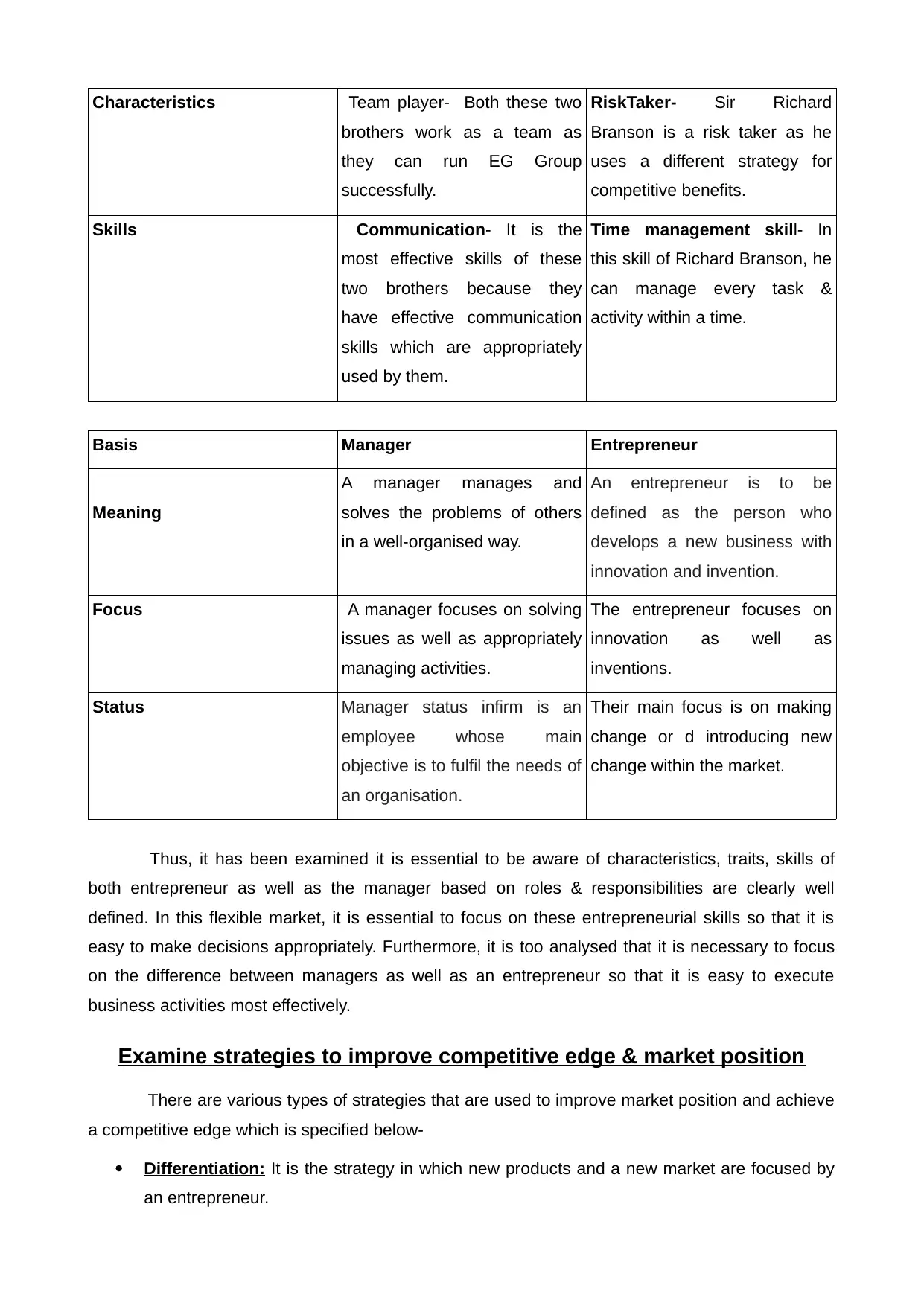
Characteristics Team player- Both these two
brothers work as a team as
they can run EG Group
successfully.
RiskTaker- Sir Richard
Branson is a risk taker as he
uses a different strategy for
competitive benefits.
Skills Communication- It is the
most effective skills of these
two brothers because they
have effective communication
skills which are appropriately
used by them.
Time management skill- In
this skill of Richard Branson, he
can manage every task &
activity within a time.
Basis Manager Entrepreneur
Meaning
A manager manages and
solves the problems of others
in a well-organised way.
An entrepreneur is to be
defined as the person who
develops a new business with
innovation and invention.
Focus A manager focuses on solving
issues as well as appropriately
managing activities.
The entrepreneur focuses on
innovation as well as
inventions.
Status Manager status infirm is an
employee whose main
objective is to fulfil the needs of
an organisation.
Their main focus is on making
change or d introducing new
change within the market.
Thus, it has been examined it is essential to be aware of characteristics, traits, skills of
both entrepreneur as well as the manager based on roles & responsibilities are clearly well
defined. In this flexible market, it is essential to focus on these entrepreneurial skills so that it is
easy to make decisions appropriately. Furthermore, it is too analysed that it is necessary to focus
on the difference between managers as well as an entrepreneur so that it is easy to execute
business activities most effectively.
Examine strategies to improve competitive edge & market position
There are various types of strategies that are used to improve market position and achieve
a competitive edge which is specified below-
Differentiation: It is the strategy in which new products and a new market are focused by
an entrepreneur.
brothers work as a team as
they can run EG Group
successfully.
RiskTaker- Sir Richard
Branson is a risk taker as he
uses a different strategy for
competitive benefits.
Skills Communication- It is the
most effective skills of these
two brothers because they
have effective communication
skills which are appropriately
used by them.
Time management skill- In
this skill of Richard Branson, he
can manage every task &
activity within a time.
Basis Manager Entrepreneur
Meaning
A manager manages and
solves the problems of others
in a well-organised way.
An entrepreneur is to be
defined as the person who
develops a new business with
innovation and invention.
Focus A manager focuses on solving
issues as well as appropriately
managing activities.
The entrepreneur focuses on
innovation as well as
inventions.
Status Manager status infirm is an
employee whose main
objective is to fulfil the needs of
an organisation.
Their main focus is on making
change or d introducing new
change within the market.
Thus, it has been examined it is essential to be aware of characteristics, traits, skills of
both entrepreneur as well as the manager based on roles & responsibilities are clearly well
defined. In this flexible market, it is essential to focus on these entrepreneurial skills so that it is
easy to make decisions appropriately. Furthermore, it is too analysed that it is necessary to focus
on the difference between managers as well as an entrepreneur so that it is easy to execute
business activities most effectively.
Examine strategies to improve competitive edge & market position
There are various types of strategies that are used to improve market position and achieve
a competitive edge which is specified below-
Differentiation: It is the strategy in which new products and a new market are focused by
an entrepreneur.
Paraphrase This Document
Need a fresh take? Get an instant paraphrase of this document with our AI Paraphraser
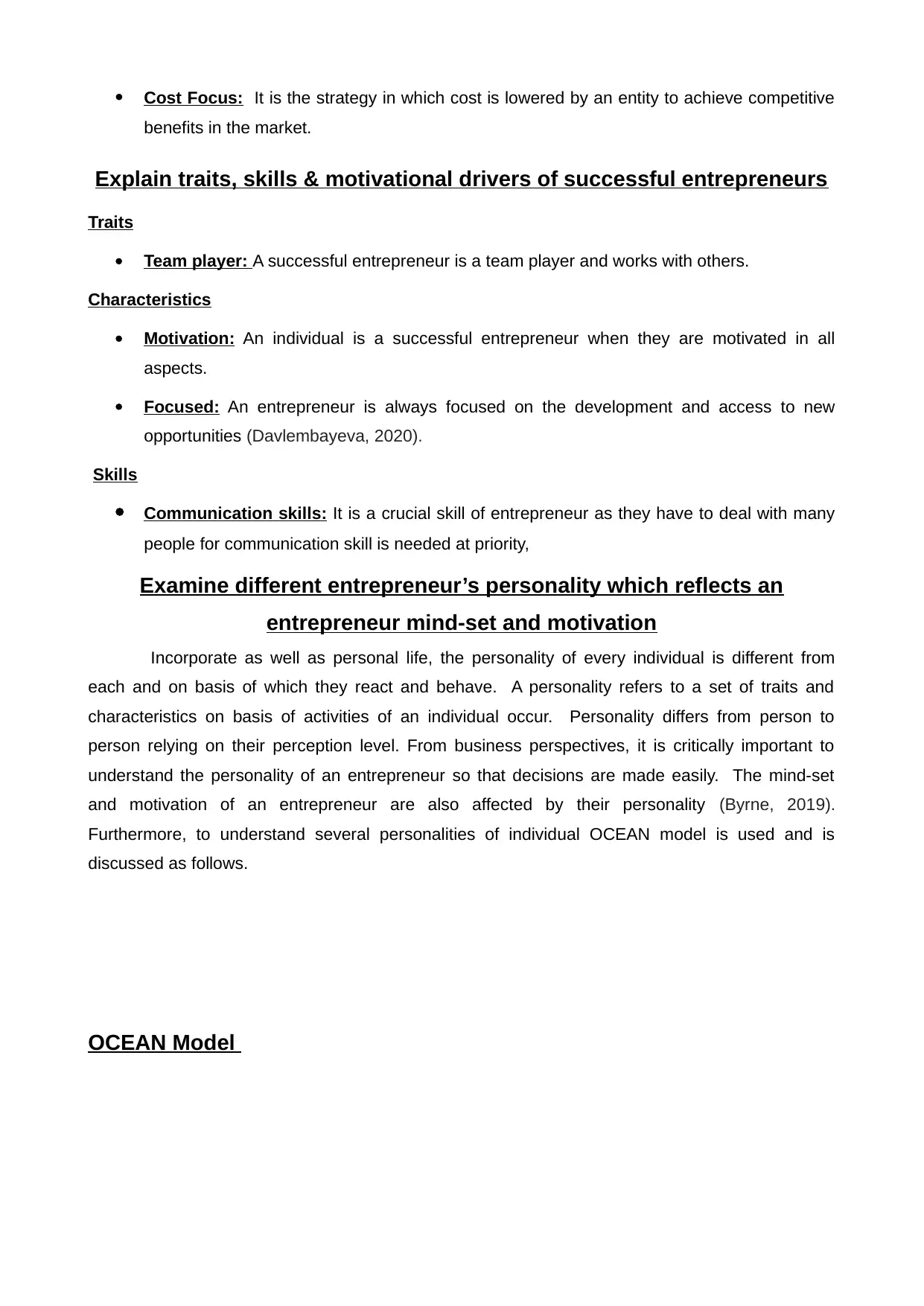
Cost Focus: It is the strategy in which cost is lowered by an entity to achieve competitive
benefits in the market.
Explain traits, skills & motivational drivers of successful entrepreneurs
Traits
Team player: A successful entrepreneur is a team player and works with others.
Characteristics
Motivation: An individual is a successful entrepreneur when they are motivated in all
aspects.
Focused: An entrepreneur is always focused on the development and access to new
opportunities (Davlembayeva, 2020).
Skills
Communication skills: It is a crucial skill of entrepreneur as they have to deal with many
people for communication skill is needed at priority,
Examine different entrepreneur’s personality which reflects an
entrepreneur mind-set and motivation
Incorporate as well as personal life, the personality of every individual is different from
each and on basis of which they react and behave. A personality refers to a set of traits and
characteristics on basis of activities of an individual occur. Personality differs from person to
person relying on their perception level. From business perspectives, it is critically important to
understand the personality of an entrepreneur so that decisions are made easily. The mind-set
and motivation of an entrepreneur are also affected by their personality (Byrne, 2019).
Furthermore, to understand several personalities of individual OCEAN model is used and is
discussed as follows.
OCEAN Model
benefits in the market.
Explain traits, skills & motivational drivers of successful entrepreneurs
Traits
Team player: A successful entrepreneur is a team player and works with others.
Characteristics
Motivation: An individual is a successful entrepreneur when they are motivated in all
aspects.
Focused: An entrepreneur is always focused on the development and access to new
opportunities (Davlembayeva, 2020).
Skills
Communication skills: It is a crucial skill of entrepreneur as they have to deal with many
people for communication skill is needed at priority,
Examine different entrepreneur’s personality which reflects an
entrepreneur mind-set and motivation
Incorporate as well as personal life, the personality of every individual is different from
each and on basis of which they react and behave. A personality refers to a set of traits and
characteristics on basis of activities of an individual occur. Personality differs from person to
person relying on their perception level. From business perspectives, it is critically important to
understand the personality of an entrepreneur so that decisions are made easily. The mind-set
and motivation of an entrepreneur are also affected by their personality (Byrne, 2019).
Furthermore, to understand several personalities of individual OCEAN model is used and is
discussed as follows.
OCEAN Model
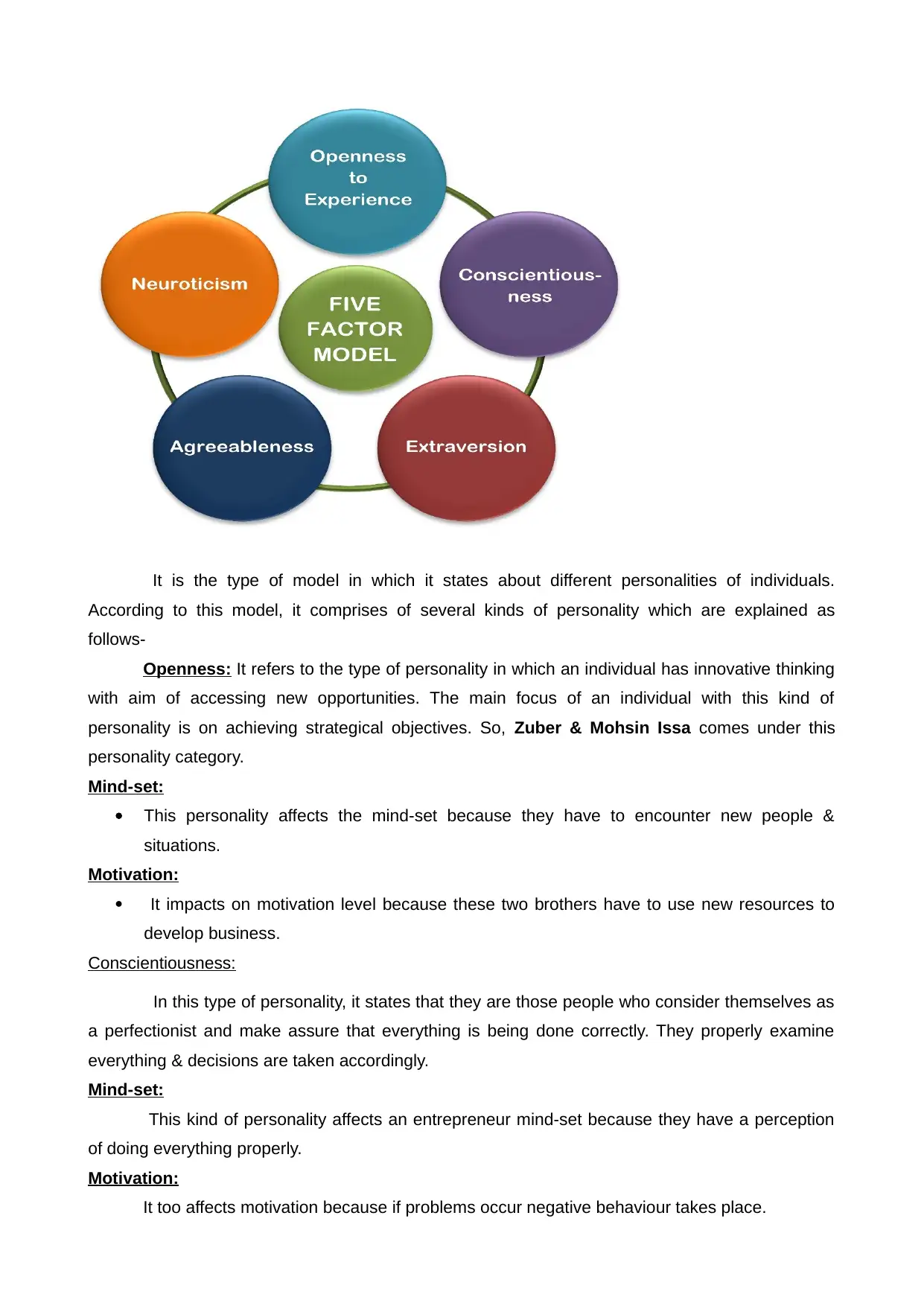
It is the type of model in which it states about different personalities of individuals.
According to this model, it comprises of several kinds of personality which are explained as
follows-
Openness: It refers to the type of personality in which an individual has innovative thinking
with aim of accessing new opportunities. The main focus of an individual with this kind of
personality is on achieving strategical objectives. So, Zuber & Mohsin Issa comes under this
personality category.
Mind-set:
This personality affects the mind-set because they have to encounter new people &
situations.
Motivation:
It impacts on motivation level because these two brothers have to use new resources to
develop business.
Conscientiousness:
In this type of personality, it states that they are those people who consider themselves as
a perfectionist and make assure that everything is being done correctly. They properly examine
everything & decisions are taken accordingly.
Mind-set:
This kind of personality affects an entrepreneur mind-set because they have a perception
of doing everything properly.
Motivation:
It too affects motivation because if problems occur negative behaviour takes place.
According to this model, it comprises of several kinds of personality which are explained as
follows-
Openness: It refers to the type of personality in which an individual has innovative thinking
with aim of accessing new opportunities. The main focus of an individual with this kind of
personality is on achieving strategical objectives. So, Zuber & Mohsin Issa comes under this
personality category.
Mind-set:
This personality affects the mind-set because they have to encounter new people &
situations.
Motivation:
It impacts on motivation level because these two brothers have to use new resources to
develop business.
Conscientiousness:
In this type of personality, it states that they are those people who consider themselves as
a perfectionist and make assure that everything is being done correctly. They properly examine
everything & decisions are taken accordingly.
Mind-set:
This kind of personality affects an entrepreneur mind-set because they have a perception
of doing everything properly.
Motivation:
It too affects motivation because if problems occur negative behaviour takes place.
⊘ This is a preview!⊘
Do you want full access?
Subscribe today to unlock all pages.

Trusted by 1+ million students worldwide
1 out of 16
Related Documents
Your All-in-One AI-Powered Toolkit for Academic Success.
+13062052269
info@desklib.com
Available 24*7 on WhatsApp / Email
![[object Object]](/_next/static/media/star-bottom.7253800d.svg)
Unlock your academic potential
Copyright © 2020–2026 A2Z Services. All Rights Reserved. Developed and managed by ZUCOL.




